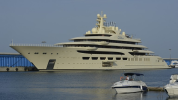Russian tycoon's superyacht seized in Germany – media
Alisher Usmanov’s $600 million vessel has reportedly been impounded in Hamburg

German authorities have seized one of the world’s largest and most expensive yachts from Alisher Usmanov after freezing the assets of the Russian billionaire as punishment for Moscow’s military attack on Ukraine, according to
Forbes.
The 512-foot superyacht, named '
Dilbar' after the owner’s late mother, was seized in a Hamburg shipyard where it was undergoing refitting work, Wednesday's report claimed, citing multiple sources.
The Uzbekistan-born Usmanov was sanctioned by the European Union on Monday for alleged links to Russian President Vladimir Putin, resulting in asset freezes and a ban prohibiting him from entering or transiting through EU nations.
Usmanov bought the custom-built vessel, which took more than four years to construct, from German shipyard Lurssen for a reported $600 million in 2016. It ranks as the world’s largest motor yacht by gross tonnage and boasts such features as two helicopter pads, a beauty salon, and a sauna. It also has the largest swimming pool ever installed on a ship of its kind.
The 68-year-old billionaire issued a
statement on Monday decrying the sanctions.
“I believe that such decision is unfair, and the reasons employed to justify the sanctions are a set of false and defamatory allegations damaging my honor, dignity and business reputation. I will use all legal means to protect my honor and reputation.”
The EU accused Usmanov of being a
“pro-Kremlin oligarch” with close ties to Putin and said he supported the Russian government’s destabilization of Ukraine. Usmanov has potentially much more to lose, including two estates in the UK that are reportedly valued at a combined $280 million, as well as luxury homes in Munich, Germany; Lausanne, Switzerland; and Sardinia. He has stepped down from his role as president of the International Fencing Federation.
Usmanov’s USM Holdings is a major sponsor of Everton. The English football club
suspended sponsorship deals with the billionaire’s companies on Wednesday amid pressure from UK government officials.
During his first State of the Union address on Tuesday, President Joe Biden warned that America will target
“Russian oligarchs and corrupt leaders who have bilked billions of dollars off this violent regime,” receiving a standing ovation from Democrats and Republicans. Discussing oligarchs, in line with America’s European allies, Biden stated that the US will begin to
“find and seize their yachts, their luxury apartments, your private jets,” in pursuit of their
“ill-begotten gains.”
On Monday, the British Department for Transport banned all Russian ships from its ports, while Spanish Foreign Minister Jose Manuel Albares has also proposed closing European ports to Russian ships as part of sanctions punishing Moscow for its attack on Ukraine.
Russia launched a large-scale military offensive in Ukraine last week, proclaiming the need to
“denazify” and
“demilitarize” the country, as well as to prevent it from obtaining nuclear weaponry, an idea recently floated by top Ukrainian officials, including President Volodymyr Zelensky.
Moscow claimed that the offensive was the only option left to end the bloodshed in the east of Ukraine and prevent Kiev from launching an all-out assault on the breakaway republics of Donetsk and Lugansk. Kiev rejected such allegations, insisting it had not planned to retake the breakaway regions by force and saying the invasion was unprovoked.

t.me











